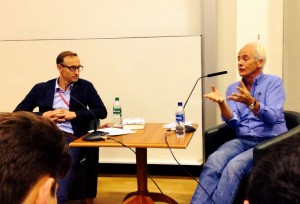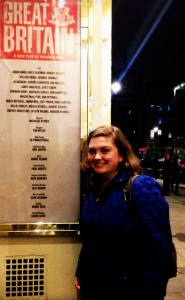“The phone-hacking scandal begins nine years ago, November 2005, with a single kneecap. The kneecap is special, because it is royal.” – Nick Davies
Tuesday evenings have quickly counted themselves among my favourites here at LSE thanks to Polis Media Agenda Talks. With my head spinning as I attempt to digest the theories presented over the course of a packed day, the agenda talks offer a practical perspective as we hear from practitioners in the field. Sponsored by Polis, LSE’s media think-tank, the talks cover a wide-range of topics and outlooks, offering great potential for discussion and debate as real-world events are framed in the context of classroom theories.

During our week covering media power, freelance journalist Nick Davies came to campus for a conversation about the UK phone-hacking scandals. Davies played a crucial role in exposing the phone-hacking activity of reporters employed by Rupert Murdoch’s media properties and recently published a book on the topic. Davies presented the events as a story about power, specifically the control exercised by Murdoch – “a bully on the playground,” as described by Davies. The tale is a vivid, tangible, somewhat frightening example of the way in which media ownership influences reporting, access to information, and protection of personal privacy. As Davies said, “It is not a remote worry. It really matters.”
 Pop culture has leveraged the ubiquity of the story in the public’s mindset for entertainment purposes – a new play on the subject recently began its run in the West End. Great Britain, written by Richard Bean, premiered at the National Theatre this summer before transferring to the Theatre Royal Haymarket at the end of September. Ahead of its premiere, the play was rehearsed in secret to avoid affecting the trial verdicts of Andy Coulson and Rebekah Brooks, former News of the World editors.
Pop culture has leveraged the ubiquity of the story in the public’s mindset for entertainment purposes – a new play on the subject recently began its run in the West End. Great Britain, written by Richard Bean, premiered at the National Theatre this summer before transferring to the Theatre Royal Haymarket at the end of September. Ahead of its premiere, the play was rehearsed in secret to avoid affecting the trial verdicts of Andy Coulson and Rebekah Brooks, former News of the World editors.
The week after hearing from Davies, I attended a performance of the play with LSE’s Drama Society. The satire employs humour, often crude, to depict the absurd levels of corruption found among reporters, politicians, and the police. Sharp, spirited performances drive the comedy, leaving the audience to enjoy a highly entertaining evening at the theatre.
But its entertainment factor does not overshadow its deeply unsettling content. In her final monologue, the central character Paige Britain, adeptly played by Lucy Punch, questions the audience’s role in the phone hacking scandals, essentially arguing journalists overstep the boundaries of the law to satisfy the public need and desire for the types of stories advanced by these techniques. It’s a question of accountability at once gut-wrenching and thought-provoking. Do we have a press, a political system, and a police force plagued by deceit and criminality because we as a public in some way asked for it?
The themes raised by the play and by Davies’ talk spoke to a core component of my studies inside the classroom – questions of power, ownership, control, and accountability as they relate to the media. The story may have begun with Prince William’s kneecap, but its escalation and exposure provide a case study ripe with points of debate for myself and my classmates, and the chance to think about these issues outside the classroom was certainly quite welcome.





